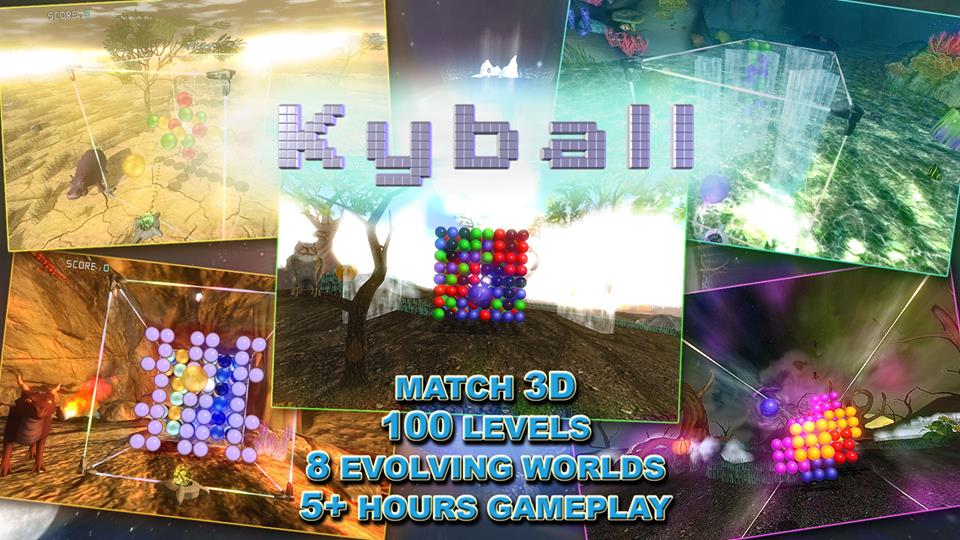Apologies for how long it has been since our last interview, we’ve been very busy of late. Fortunately, we managed to schedule some time to have a chat with Bill Kotsias, the developer behind the indie PC game Kyball. So, to get your Full Sync fix, keep reading on…
Hello Bill. Let’s start with a small introduction; who are you and what do you do?
Hi, I am Bill Kotsias, I live in Thessaloniki, Greece. My first game – Wizard Apprentice – was released in 1996, when I was 18. It was for an obscure British OS and computer, RISC OS and RISC PC respectively. The computer has vanished, but its CPU went on to dominate the world thanks to the smartphone revolution.
And what was it that got you into game development? Were you inspired by any childhood games?
I always felt like I wanted to create video games. Although I first played games on an Amstrad CPC in 1986, it was the early 32bit games that really triggered my imagination. 256 colours, millions of moving pixels, 3D vector graphics. Archimedes ruled back in the day!
Now we’ve gotten to know you a little, maybe you could tell us about the Indie scene over in Greece? We’ve spoken to devs all over the world but have very little knowledge of what it’s like over there.
The crisis has really, really hurt us all these years. Greece itself never was an important games market for us developers anyway, but capital has generally disappeared from the country, investments are non-existent and we are having a hard time trying to be creative and develop exciting stuff with little to no funding.
I’d say things are pretty premature as far as game development is concerned.
Does working in a country not so well known for Game Development cause issues for developers like yourself? Or have platforms like Steam Greenlight and Social Media sites such as Facebook and Twitter helped in recent years?
I don’t see any issues because of this. What hurt us are economic and political reasons that are beyond the scope of this interview.
Steam has certainly helped grow the indie market, but in a global sense, not just for Greek devs. The same applies – but in a different way – to social networks.
Moving on, let’s discuss your game Kyball; tell us what it’s all about.
Kyball is Puzzle Bobble but in full 3D. The added dimension is not cosmetic and this has led to an all-new kind of game… which was a good thing and a bad thing. It was a good thing because it was the first of its kind: no-one else has ever done anything similar before. But it was also a bad thing cause we had no idea what audience we should direct it to. In the end, we created a hardcore game that totally looks like a casual game. Teratogenesis.
What was it that inspired you to make Kyball? Is this a genre you’ve always been a fan of?
Puzzle Bobble has been one of my all-time favourites. Transforming popular 2D genres to 3D has always seemed very intriguing to me – at least after Mario 3D came along. So, there you go.
What have you done to make Kyball stand out from the competition and freshen up the genre?
Well, we’ve made Kyball so unique that it doesn’t have any competition at all! It’s a one-of-its-kind alright. But one must really have sight beyond sight to handle such a premise successfully.
Kyball has been in development for many years now; were there any major issues during development that caused the delays? What software were you using and would you change to something else for future projects?
Kyball started in 2009 and was steadily developed for 15 months. With only 3-4 months to go and due to the crisis, our resources disappeared overnight. We were forced to put it aside indefinitely and search for work that would promptly bring food to the table.
At that time, the best graphics and audio engines were very expensive, so we went for OGRE and OpenAL. Today, for a project like this, I would go for Unreal and FMOD.
And following on from that, have you had any moments during Kyball’s development that you’d consider major successes?
Yes! Actually completing the game in a complete form and as designed on paper was a major success. Do you know what’s the most important part of project development? Finishing it.
Can you tell us if you have any other projects you’re currently working on?
We are trying to secure funding for another all-new, one-of-its-kind 2D action game. If we manage to make this first step, we are confident it will be a title that will make an impact in 2017.
Time to start wrapping things up; firstly what advice can you offer to people wanting to get into game development?
I would advise them to have their feet steady on the ground. Know the facts beforehand and don’t be naive. 95% of 1st-time game projects are doomed to fail. Communicate your project as early and as much as possible, never keep it under wraps till the end.
Next question revolves around VR. There are quite a few Indie developers trying to create VR games hoping the market takes off, but there are a lot of concerns around the sickness caused by VR. What are your views on the subject?
We are not currently considering VR for our future projects, we’ll wait 1-2 years and see how it goes.
And finally for a bit of fun; what is your favourite food?
Mousakas. No really. The homemade kind.
That’s all folks! We’d like to thank Bill for taking the time out of his day to chat with us and give us an insight into his experience as an indie game developer. If you’d like to know more about Bill or his game Kyball, you can find details below like usual:
Developer Bio
Website
For even more interviews, click right HERE.

